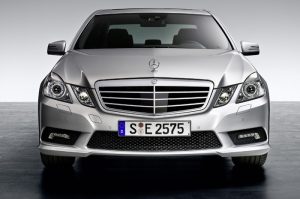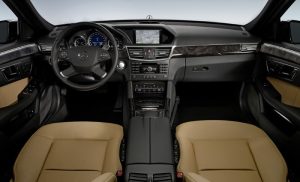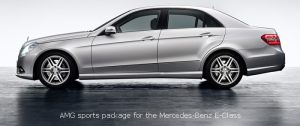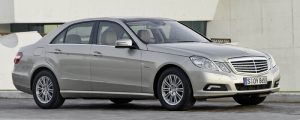Mercedes-Benz is once again setting the standard with the new 2010MY E-Class in terms of safety, comfort and advanced technology in its market segment. The sedan further emphasizes the leading position held by Mercedes-Benz in the luxury class, with a unique combination of driver assistance systems. These include ATTENTION ASSIST, Adaptive High Beam Assist and automatic emergency braking, which is activated under immediate threat of a collision.
Mercedes-Benz has improved the already exemplary long-distance comfort of the E-Class even further in the new sedan. Advances include intelligent bodyshell technology with up to 30 percent greater stiffness, further improved seats and a newly developed suspension system with shock absorbers that automatically adjust to the driving situation. The available AIRMATIC suspension now works together with a continuously variable electronic damping system.
The outstanding safety and comfort of the E-Class are matched by its environmental compatibility and economy. The E-Class comes to the U.S. market with V6 and V8 gasoline engines, as well as the groundbreaking 50-state 3.0 liter BlueTEC diesel (launching in CY 2010) – the world’s cleanest diesel engine, compliant with ULEV and Bin 5 standards.
The power plants of the new E-Class offer an outstanding combination of performance and efficiency. Engineers from every development department have worked together to optimize assemblies and components, saving fuel through reduced weight, new design, improved function or efficient energy management.
The work done in the wind tunnel was particularly successful. With a drag coefficient of only 0.25, the new E-Class is the world’s most aerodynamically efficient luxury sedan. It betters its predecessor’s already excellent Cd figure by another four percent.
Other measures include energy-saving control of the alternator, fuel pump, air conditioning pump and power steering. Displays in the speedometer inform the driver how much fuel is being consumed (miles per gallon), and advise when to shift up a gear to maintain a more efficient driving style.
AMG sports package for the Mercedes-Benz E-Class
Engines – outstanding performance
The engines available for the new E-Class at U.S. market introduction include a 268 hp V6 in the E350 and a 382 hp V8 in the top-of-the-line E550.
Late 2009 will see the arrival in the U.S. of the E63 AMG, generating an impressive 507 hp; followed in 2010 by the V6 turbodiesel in the E350 BlueTEC, which will meet ULEV and BIN 5 standards.
All models are equipped with a seven-speed automatic transmission and a column-mounted shift lever as standard.
At market introduction, both the E350 and E550 will be available in rear-wheel drive format, with the latest generation 4MATIC all-wheel drive arriving as an option in fall 2009. Now mated to the seven-speed automatic transmission, this system further distinguishes itself from previous all-wheel drive technology with greater efficiency, lower weight and more compact construction. These advantages produce noticeably better traction and fuel consumption.
Safety – “Intelligent” partner with unique combination of assistance and protection systems
For more than 50 years, E-Class sedans and their predecessors have been acknowledged as trendsetters in safety. The new sedan continues this tradition with an unrivalled combination of the very latest assistance and protection systems conceived and developed on the basis of real-life accident scenarios. These technologies make the E-Class an “intelligent partner” that can see, feel, react instinctively and function independently in critical situations to prevent accidents or mitigate their consequences. With this concept, the new Mercedes not only protects its own occupants, but also contributes significantly to the improved safety of others.
The new E-Class is the first automobile in the world with headlamps that adapt to the traffic situation and respond automatically to avoid dazzling other drivers. The optional Adaptive High Beam Assist uses a camera on the windshield to recognize oncoming traffic and vehicles driving in front, and adjusts the headlamps so that their beams stop short of the other vehicle. The range of the low headlamp beams can thus be extended from their current 220 feet to up to 984 feet. If the road ahead is clear, the system performs a gentle transition to high beam.
Mercedes-Benz offers this new system within its Premium 2 package that includes bi-xenon headlamps and LED daytime running lights.
The Driver Assistance package for the new E-Class includes among other features Blind Spot Assist familiar from the S-Class and, as a new development, Lane Departure Warning, aimed at preventing accidents caused by drifting across lanes. When the system recognizes that the car is leaving its lane unintentionally, the driver is prompted to counter steer through brief but noticeable vibrations of the steering wheel.
Night View Assist from the S-Class has been improved to create Night View Assist PLUS, which is now also available as an option in the new E-Class. Mercedes-Benz has enhanced this system with a special pedestrian detection function – as soon as Night View Assist PLUS detects pedestrians ahead of the car, they are highlighted in the onboard display, thus significantly improving the warning effect.
Drowsiness detection based on 70 parameters as standard
Thanks to innovative technology, the new E-Class has a highly sensitive feel for its driver’s attentiveness, and warns him of drowsiness ahead of time. This new, production standard ATTENTION ASSIST drowsiness detection system is equipped with highly sensitive sensors that continuously monitor more than 70 different parameters. Observing the driver’s steering behavior has proven to be a particularly strong indicator. Several years of research in the field by Mercedes engineers demonstrate that drowsy drivers make minor steering errors that can often be rapidly corrected in characteristic ways. When these corrections are recognized by a highly sensitive steering angle sensor, ATENTTION ASSIST emits an audible warning accompanied by a visual warning in the instrument cluster.
Automatic emergency braking when a collision is imminent
The well-proven, radar-based assistance systems from the S-Class are now also available as options to E-Class customers. A further development of the long-range radar sensor now has a range of 656 feet (previously 492 feet), and is able to monitor the mid-distance so that dynamic events such as a vehicle ahead suddenly pulling out to overtake can be detected even more effectively. The two wide-angle, short-range radar sensors, with a range of approximately 100 feet, remain part of the system.
The radar systems are able to assist the driver with emergency braking. Their sensors are linked to the Brake Assist PLUS system, which automatically calculates the braking pressure to prevent a collision in critical situations. The driver is given a simultaneous acoustic and visual warning. When the brake pedal is depressed, the system immediately activates the calculated level of braking assistance.
If the driver fails to respond to the warnings, the radar system first initiates partial braking action. As a second stage, if there is still no driver response and a collision is unavoidable, emergency braking is initiated. This can considerably lessen the severity of an accident, i.e. the system acts something like an “electronic crumple zone”.
Eleven airbags and PRE-SAFE® as standard
During the course of its development, the new E-Class was subjected to more than 150 high-speed crash tests. The crumple zone principle invented by the Mercedes safety pioneer Béla Barényi has been continuously improved by engineers in Sindelfingen. The E-Class’ front-end deformation zone acts on four independent levels, and is even more effective than before. The increased use of highest-strength steel alloys also helps to ensure that the bodyshell is able to withstand high impact forces. Approximately 72 percent of all the body panels are made from these hi-tech steels – yet another unrivalled figure in passenger car development.
The new E-Class has even more extensive safety features than the outgoing model, with eleven airbags as standard – two rear side impact, two front side impact, two front airbags, two pelvic airbags (new), curtain airbags and a driver knee airbag. These are in addition to belt tensioners, belt force limiters, crash-responsive head restraints and LATCH child seat attachments.
Another standard feature is the preventive occupant protection system PRE-SAFE®. In potentially hazardous situations this reflexively activates precautionary protective measures for the vehicle occupants, enabling the seat belts and airbags to maximize their protective function during an impact.
Comfort – further progress with adaptive shock absorbers and improved AIRMATIC suspension
As in the field of safety, the E-Class has been setting the benchmark for long-distance comfort in this vehicle class for decades. Mercedes engineers have achieved further advances with the new sedan to better the already high level of the previous model – particularly in respect of ride and seating.
Standard equipment includes a further-improved suspension with adaptive shock absorbers. These automatically adapt to the current driving situation by reducing the damping forces when driving normally, thereby noticeably improving ride comfort. With a more sporty driving style or during rapid evasive action, the system applies maximum damping forces to provide the best possible stability.
Alongside the comfortable set-up of the production standard 4-wheel independent suspension with coil springs and stabilizer bars, there is also an optional version with dynamic damping characteristics and a lowered ride height.
The AIRMATIC suspension system comes as standard in the E550/E550 4MATIC. For the first time, it has been combined with an electronically controlled damping system that processes various sensor signals and controls each wheel independently. Thus, Mercedes customers experience significantly improved ride comfort, while gaining benefits in safety and agility at the same time. The driver is able to select either comfort or sport mode at the touch of a button.
Well-proven seat technology with a new design
In terms of seat development, Mercedes-Benz has added a new quality to a well established Mercedes concept, namely padded seat piping – a complex manual upholstery technique employed only by Mercedes-Benz. This involves the insertion of an additional foam filling directly beneath the fabric or leather upholstery to provide a soft and pleasant seating sensation immediately upon entering the car. There are different versions of this padded seat piping – in the Sport model, the upholstery is transversely contoured, while the Luxury model has longitudinal piping and is reminiscent of the familiar and well-proven Mercedes seat design from the 1960s and 70s.
Active multi-contour seats with massage function from the S-Class
The active multi-contour seats (optional) include newly developed comfort head restraints and a two-stage massage function in the backrest that has proven highly successful in the S-Class. High-speed piezo-electric valves on the air chambers in the backrests vary their pressure and volume in accordance with steering angle, lateral acceleration and vehicle speed, to give the driver and front passenger even better lateral support.
Design – Distinctive lines express refinement and status
In 1995, the E-Class was the first Mercedes model to appear with the much-acclaimed twin-headlamp face – a highly symbolic design feature that still characterizes the identity of the E-Class. Nevertheless, the design language remains evolutionary even for this hallmark styling feature, and has been adapted to suit the self-assured, masculine overall appearance of the sedan. The designers have now completely reinterpreted these four “eyes”, turning for their inspiration to the intriguing geometric forms of cubism. These new lights resemble precious gem stones that have been precision cut from the fenders. Likewise, the radiator grille, with its three-dimensional chromed surround, dynamic arrow-shape and steeper angle, underlines the car’s premium luxury positioning.
The sophisticated interplay between lines and surfaces is one of the hallmarks of today’s Mercedes design. Large concave or convex surface areas structured by taut, clearly defined lines. This design concept has been perfected down to the last detail in the new E-Class. The contours along the flanks become connecting elements that influence the entire body design, i.e. not just the side view but also the front and rear-end styling.
At the rear, this harmonious flow culminates in a new feature – a sweeping line that stretches over the rear wheel arches and lends a clear contour to the imposing, muscular form of the rear fenders. Mercedes aficionados will recognize styling features reminiscent of the famous 1953 “Ponton Mercedes”, which conveyed its refined character with these striking contours — a symbolic feature and, at the same time, a hallmark of the E-Class that underscores how the traditional and the futuristic harmonize in this model line.
Designers have also created the interior of the new E-Class with the attention to detail that is characteristic of Mercedes, ensuring that the form, color and material of every single element combine to inspire on both an emotional and functional level. The result is an harmonious overall composition – an atmosphere in which the car’s occupants immediately feel safe and protected, and able to drive long distances without feeling stressed.
Model range – High level of standard equipment and individual variants
Individuality and variety have always been two of the outstanding attributes of the E-Class. The new sedan not only provides Mercedes customers with a choice of four engines and three suspension variants, but also Sport and Luxury model lines, ten exterior paint finishes and eight different seat upholstery color combinations to suit their individual preferences. The choice of interior trim includes Burl Walnut or Black Ash, complimented by standard ambient lighting.
Standard equipment for Luxury models includes 17-inch 5-twin-spoke wheels, along with the COMAND controller, ambient lighting and a unique instrument cluster. Oval exhaust pipes are standard fit on the E350 Luxury, while those on the E550 Luxury are trapezoidal.
In contrast, the Sport models come with larger 18-inch 5-spoke wheels, a tubular-design instrument cluster and trapezoidal exhaust pipes on both the V6 and V8 variants.
Equipment packages – extras for the discerning customer
In addition to the design and equipment lines, US customers can choose from a range of packages that provide more scope for equipping the new E-Class to suit personal tastes.
The Premium 1 Package includes the navigation system with voice control, 4 GB music register, SIRIUS real-time traffic information, iPOD/MP3 media interface, SIRIUS satellite radio/HD radio, rear-view camera, rear sun shade and heated seats (standard on V8).
In addition to the features of the Premium 1 Package, the Premium 2 Package includes an electronic trunk closer, Intelligent Headlamp Control, Adaptive High Beam Assist, bi-xenon headlamps, LED daytime running lights and Keyless Go.
With the Driver Assistance Package, customers also receive DISTRONIC PLUS cruise control, Blind Spot Assist and Lane Departure Warning, while the Sport Package comes with 18-inch AMG alloy wheels and an AMG sport steering wheel.
Stand-alone options include PARKTRONIC with Parking Guidance, Night View Assist PLUS, panorama sunroof, split folding seats, wood-leather steering wheel, Drive-Dynamic multi-contour driver’s seat with massage function, rear-seat entertainment system and full leather interior.




